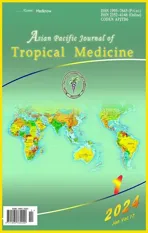Unveiling health rights: A call to action for sex workers' HIV care in the Philippines
2024-03-14SheikhMohdSaleemShahSumayaJan
Sheikh Mohd Saleem ,Shah Sumaya Jan
1Health Section,International NGO,New Delhi,India
2Department of Anatomy,Govt.Medical College,Srinagar,India
We are writing in response to the article titled “Addressing the needs and rights of sex workers for HIV healthcare services in the Philippines”[1].The article calls for attention on the significant challenges faced by sex workers in the Philippines in accessing HIV healthcare.We appreciate the article’s effort to examine these issues in depth.We would like to present a constant flow of thoughts in this letter while highlighting the positive aspects,potential obstacles,and additional points that contribute to this ongoing discussion.
The authors rightfully emphasized the necessity of decriminalizing consensual sex work to enhance the safety and health of sex workers.By removing the legal stigma associated with their profession,sex workers could be encouraged to seek healthcare services without the fear of repercussions.However,it is crucial to recognize that decriminalization might face resistance from segments of society with conservative views[2].Therefore,it is necessary to balance the benefits of decriminalization with addressing public concerns.
The call to expand health promotion programs and activities is well-founded.Engaging with areas where sex work takes place,such as brothels and online platforms,could effectively raise awareness about HIV prevention and the availability of testing and treatment services.This proactive outreach could significantly bridge the gap between marginalized populations and accessible healthcare facilities.However,it is essential to acknowledge that coordinating efforts among government agencies,advocacy groups,and nongovernment institutions might require substantial time and resources to overcome potential challenges.
Acknowledging the unique vulnerabilities of sex workers,especially those who are economically disadvantaged,children,or have used drugs,is of great importance.It is crucial that both government and non-government organizations prioritize providing targeted support for these subgroups.This support should encompass access not only to healthcare services but also to essential resources that contribute to their overall well-being.
While the article underscores several significant points,it could benefit from an explicit mention of comprehensive sex education.Equipping sex workers with accurate information about safe practices and promoting responsible sexual behavior through education can play a pivotal role in reducing HIV infection rates among this population[3].
In addressing the needs of sex workers,it is imperative to consider raising awareness among their clients.Encouraging responsible behavior and regular testing for sexually transmitted infections could contribute to a comprehensive approach to HIV prevention[4].Additionally,recognizing the emotional challenges sex workers face due to societal stigmatization and providing access to mental health support services is equally vital[5].Attending to the psychological well-being of sex workers could positively influence their overall health and help-seeking behavior.
Lastly,the article aptly highlights the need for comprehensive reforms to address the healthcare needs and rights of sex workers in the context of HIV prevention.While advocating for decriminalization and enhanced health promotion programs holds promise,it is important to acknowledge the potential challenges posed by societal resistance and coordination issues.Moreover,embracing a broader approach to education and support,as well as considering intersecting vulnerabilities,should remain central to this discourse.We trust that these points contribute to the ongoing conversation aimed at ensuring equitable healthcare for all individuals,regardless of their social circumstances.
Conflict of interest statement
The authors declare that they have no conflict of interest.
Funding
The authors received no extramural funding for the study.
Authors'contributions
SMS conceptualised and designed the study,collected and analysed the data,and drafted the initial manuscript.SSJ contributed to the study design,data analysis,and critically reviewed and revised the manuscript for important intellectual content.Both authors approved the final manuscript as submitted and agree to be accountable for all aspects of the work.
杂志排行
Asian Pacific Journal of Tropical Medicine的其它文章
- Fatal cases in pediatric patients after post-exposure prophylaxis for rabies: A report of two cases
- Mapping COVID-19 in India: Southern states at the forefront of new JN.1 variant
- Ferritin and mortality in hemodialysis patients with COVID-19: A systematic review and meta-analysis
- Iron supplementation during malaria infection in pregnancy and childhood: A review
- Informing policy makers in developing countries: Practices and limitations of geriatric home medication review in Malaysia-A qualitative inquiry
- Occurrence of K1 and K2 serotypes and genotypic characteristics of extended spectrum β-lactamases-producing Klebsiella pneumoniae isolated from selected hospitals in Malaysia
